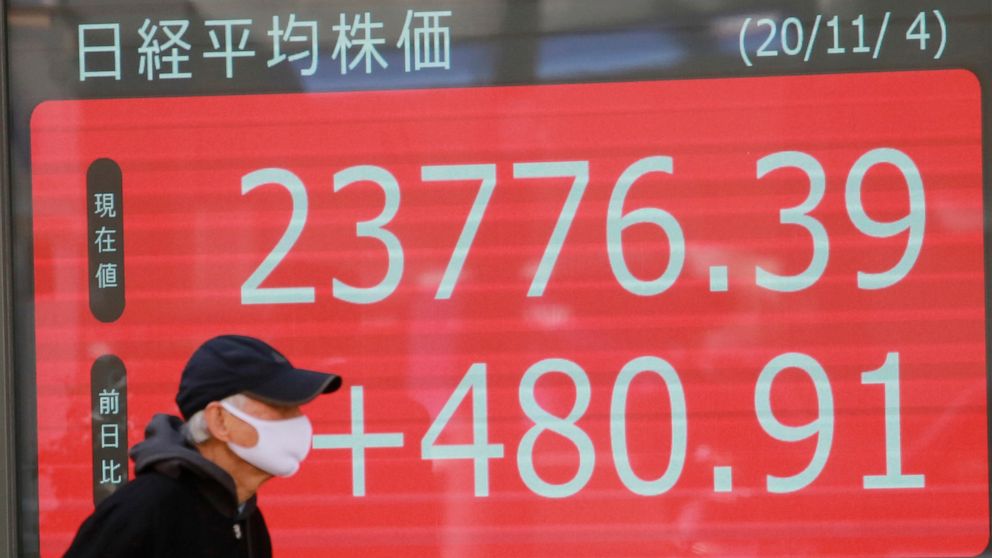US futures, world markets rise as investors eye US election
U.S. futures rose and Asia markets were mostly higher on Wednesday as investors worldwide awaited the results from the U.S. presidential election.
Just after 10 p.m. Eastern time, President Donald Trump and Democratic challenger Joe Biden were locked in tight races in battleground states. Most polls have predicted a Biden victory.
Many investors took forecasts of a so-called “blue wave” of Democratic Party wins as a signal that the U.S. economy might soon get a big, fresh infusion of help. But with the race too close to call, analysts said they also might be reassured by the prospect for a continuation of Trump’s pro-market stance.
“Markets seem to be pricing in better chances for Trump, or at least a smaller chance of a blue wave,” Stephen Innes of Axi said in a commentary.
“On the one hand with the fiscal implications of a Biden win/blue wave that’s a bit of a surprise -– on the other Trump is widely considered more market-friendly, so one can see how it nets out a small positive,” Innes said.
As of midnight Eastern time, Dow futures were up 0.8% and the S&P 500 futures rose 1.6%. Both initially fell as election returns began coming in. The Nasdaq futures fell back, losing 0.2% after earlier gaining 3.5%. The gains in the futures follow a strong performance in regular trading Tuesday on Wall Street.
In Asia, the Nikkei 225 in Tokyo jumped 2.1% to 23,783.29 on Wednesday, while the Kospi in Seoul added 0.8%, to 2,361.70. India’s Sensex surged 0.9% and the S&P/ASX 200 edged 0.1% higher to 6,072.20.
The Hang Seng in Hong Kong was flat at 24,933.48, while the Shanghai Composite Index also was almost unchanged, at 3,272.06.
Caution appeared to prevail as investors considered the implications of a last-minute decision by Chinese regulators to suspend the planned trading debut for shares in Ant Group, the fin-tech spin-off of e-commerce giant Alibaba, after what was expected to be a nearly $35 billion initial public offering.
The decision late Tuesday caused the plans for trading in Shanghai and Hong Kong to be put off due to what the Chinese stock market watchdog said were “major issues” with Ant Group’s regulatory compliance.
Investors hope the end of a bruising U.S. presidential campaign may soon lift the heavy uncertainty that’s sent markets spinning recently. So far, Trump and Biden have won the states they’re expected to win and no battleground states have been decided. Early returns in Florida point to a tight race in that key state.
Markets around the world were rattled in 2016 as results in the presidential election suggested Donald Trump was running ahead of Hillary Clinton. The S&P 500 slumped early the following day, but ended 1.1% higher.
The result of the presidential election might not be known for days because of the large number of Americans who voted early. More than anything, what investors hope for from the election is a clear winner to emerge, even if it takes some time. History shows stocks tend to rise regardless of which party controls the White House.
The biggest concern is that a contested election could drag on, inflicting still more uncertainty on markets buffeted this year by bouts of volatility amid the coronavirus pandemic.
A cliffhanger could bring a sharp drop in share prices. The makeup of the Senate is another unknown throwing uncertainty into the markets. Another is the timing of a possible COVID-19 vaccine.
The S&P 500 rose 1.8% to 3,369.16 on Tuesday for a second straight gain. The Dow Jones Industrial Average climbed 2.1%, and the Nasdaq composite added 1.9%.
Shares in sectors that would benefit greatly from an ample support package for the economy, especially if Democrats were to control the Senate, were among the biggest gainers, including smaller companies and industrial businesses.
If Trump wins and the Senate stays under Republican control there would likely be less stimulus than under a Democratic sweep, said Chris Zaccarelli, chief investment officer for Independent Advisor Alliance. A Biden win and Republican Senate would mean the lowest chance for stimulus.
Investors and economists have been clamoring for a renewal of stimulus since the expiration of the last round of supplemental benefits for laid-off workers and other support approved earlier by Congress.
But investors see cases for optimism in other electoral scenarios, too. A Trump victory would likely mean a continuation of lower tax rates and lighter regulation on businesses, buoying the corporate profits that are the lifeblood of the stock market.
Many professional investors what matters most is what happens with the pandemic and whether a vaccine can arrive soon to help the economy heal.
Several European governments are bringing back restrictions on businesses to curb worsening virus counts. Surging infections in the U.S. raise worries that fear alone of the virus could hurt business activity as people stay home and pinch pennies.
Apart from the election, investors are awaiting the Federal Reserve’s decision on its interest-rate policy on Thursday. Its earlier moves to slash interest rates to record lows and to step forcefully into bond markets to push prices higher have helped Wall Street soar since March.
The Labor Department is also releasing its jobs report for October on Friday, where economists expect to see another slowdown in growth. Meanwhile, corporate earnings reports are showing lower profits in the last quarter, but not as miserable as Wall Street had feared.
![]()


